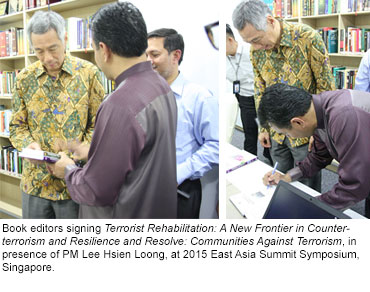System Upgrade on Tue, May 28th, 2024 at 2am (EDT)
Existing users will be able to log into the site and access content. However, E-commerce and registration of new users may not be available for up to 12 hours.For online purchase, please visit us again. Contact us at customercare@wspc.com for any enquiries.

This book aims to provide an overview of the importance of communities to mitigate the threat of terrorism, drawing key lessons and experiences from countries adopting community-based approaches. There has been growing recognition among countries to understand the construct of radical ideology and the tools needed to counter its narrative through a more socially inclusive approach, using communities as key stakeholders that have the resolve to be resilient in the fight against terrorism. The chapters provide invaluable insights on the psychological aspects of radicalization, the centrality of counter-ideology and case studies of approaches to promoting moderation, religious harmony and community engagement in building the resilience and resolve against terrorism.
Sample Chapter(s)
Chapter 1: Resilience and Resolve: Community Engagement to Community Resilience (280 KB)
Contents:
- Resilience and Resolve: Community Engagement to Community Resilience (Jolene Jerard and Salim Mohamed Nasir)
- Significance Quest Theory as the Driver of Radicalization Towards Terrorism (Arie W Kruglanski, Michele J Gelfand, Jocelyn J Bélanger, Malkanthi Hetiarachchi, Rohan Gunaratna)
- An Internal Critique of Al-Qaeda (Sherman A Jackson)
- The Concept of Al-Wasatiyyah and the Significance of Islamic Moderation (Mohd Kamal Hassan)
- The Centrality of Counter-Ideology in Countering Jihadist Terrorism (Muhammad Haniff Bin Hassan)
- Community Engagement to Counter-Extremism: A Global Imperative (Rohan Gunaratna)
- Deconstruction of Radical Ideology and Detainee Reintegration (Mal Hettiarachchi)
- A Community Counter-Ideology Response: Reaching Out to the Youth (Thomas Koruth Samuel)
- Promoting Religious Harmony (Mustafa Ceric)
- Catalyst for Change: Communities Against Terrorism (Jolene Jerard and Salim Mohamed Nasir)
Readership: Graduate students, researchers on extremism, terrorism and radicalization of religious groups, and general readers who are interested in the development of terrorism and counter-terrorism.

























